Written By Khine Zaw
With the end of the winter season, the transition to summer has begun. The winds that blow are no longer cool like they used to be; instead, they are warm. Dust and sand particles continue to drift through the air. The shimmer, caused by the scorching daytime heat, is also occurring there.
Due to the change in weather, the cold winds no longer blow. Under the intense heat of the summer, with no shade from the trees, a person is seen sitting on the field embankment, gazing at the withered chili fields that are shriveling under the scorching sun.
He is U Kyaw Win, a chili farmer from Pauktaw Township, who mainly cultivates winter crops.
At the age of sixty, U Kyaw Win has been growing winter crops for over thirty years, supporting his family’s livelihood and solving their educational needs.
In previous years, he grew a variety of crops, including chili, eggplants, and Maymyo flower. However, this year, he focused solely on cultivating one type of pepper over two acres of land.
In the past few years, chili had become scarce in the Arakan region, and their prices soared. Hoping to make a higher profit, he decided to plant only one variety of chili.
He mentioned that, with all communication routes cut off and no supplies of vegetables coming from the central regions of Myanmar, he aimed to ensure the stability of his crops to support the food security in the Arakan region.”
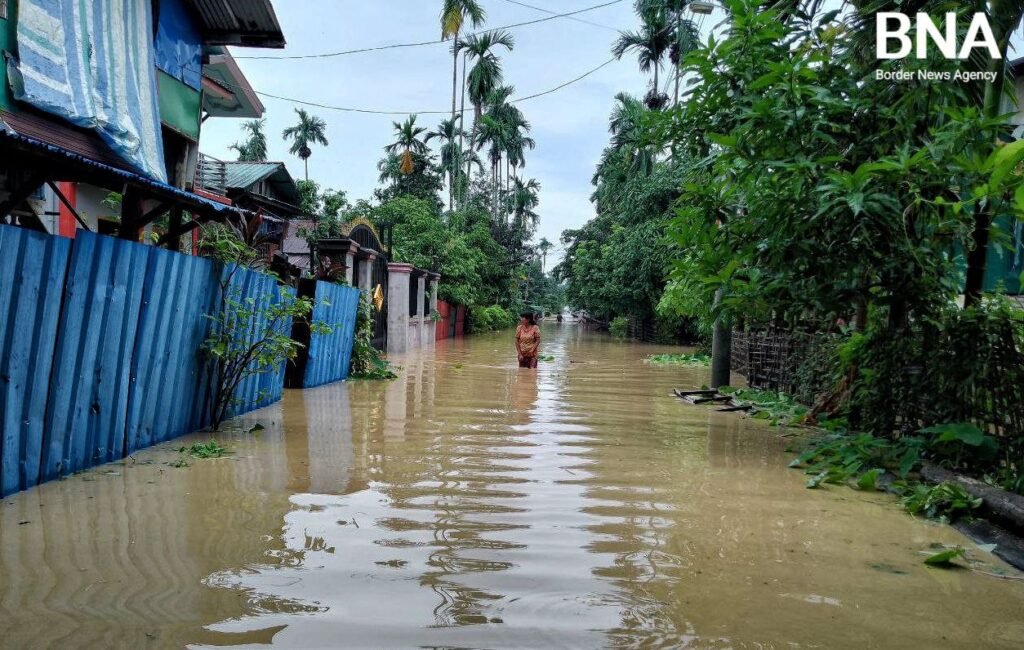
However, things did not turn out as he had hoped. Despite his expectations, the situation took a turn for the worse, and the crops eventually failed.
U Kyaw Win, who has been cultivating winter crops near the creek for over two decades, has been drawing water from the creek using a water pump to supply his fields.
Additionally, when necessary, he has also dug a small pond near his farm to store water for use.
However, this year, the creek has become salty, so he is no longer able to supply water to the chili fields he has planted.
“Is it due to the high tides or the extreme heat? This river has become salty. It was salty in previous years too, but this year, the salinity came much earlier,” U Kyaw Win told Border News Agency. “The seasonal weather changes are becoming more noticeable.”
[Currently, global climate change is causing temperatures to rise and sea levels to increase.]
[Between 1990 and 2019, sea levels rose by 6 centimeters, and it is estimated that by the year 2100, they could rise by up to 50 centimeters.]
U Kyaw Win noted that even the reservoir he had dug as a backup was beginning to dry up.
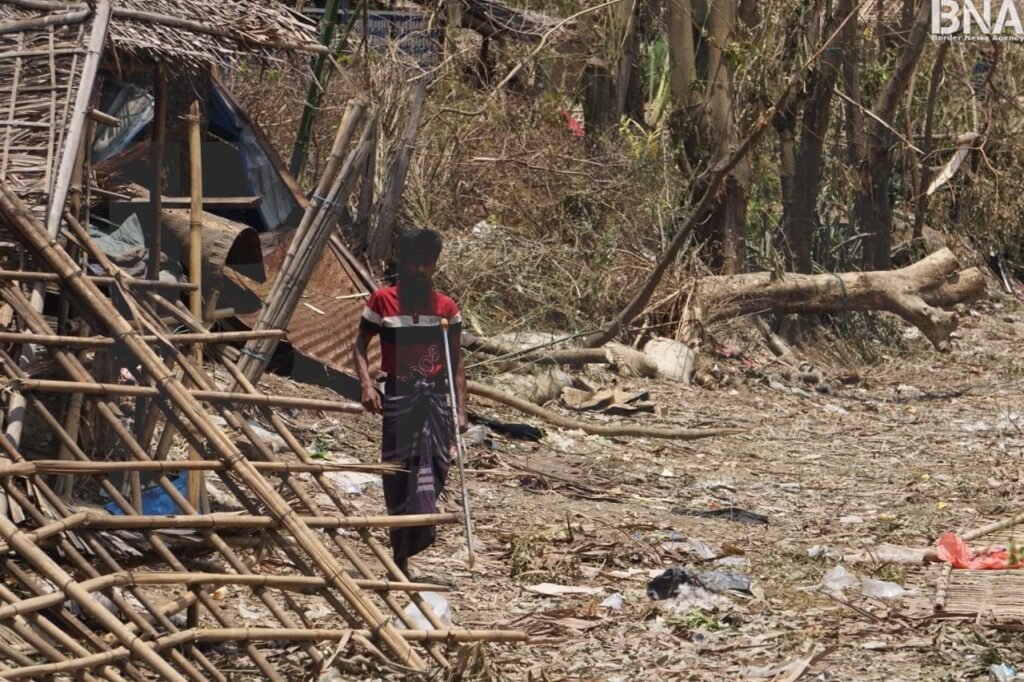
“The reservoir will completely dry up soon. There won’t be any water left for irrigation,” he said.
As a result, U Kyaw Win’s chili plants, which still have some buds and blooms, are now wilting and turning yellow. “It’s not even about making a profit. I’ve only been able to harvest and sell them two or three times. Without enough nutrients and water, the plants are drying up before they fully mature,” he explained.
“I spent 10,000 kyats per liter of fuel just to pump water, but I haven’t even sold enough to cover my costs. Now, the water is gone. I’ll have to abandon the farm. I invested a lot in this,” U Kyaw Win said with a deep sigh.
Additionally, U Kyaw Win’s chili farm is struggling not only due to a lack of water but also because of extreme heat and inconsistent temperatures. These conditions have led to an increase in pest infestations and plant diseases.
“I used to grow a lot of chilies before, and I didn’t have to use so many pesticides. But now, even with pesticides, I can’t keep up. There are so many new diseases appearing,” U Kyaw Win said.
Farming Becomes More Difficult Amid Climate Change
Like U Kyaw Win, other farmers across Arakan are also struggling due to unusual weather patterns.
With global warming intensifying each year, rising temperatures have made water scarcity a major challenge for winter crop farmers.
Experts and farmers alike have observed that groundwater levels are gradually decreasing, adding to their difficulties.
“In the past, digging a little was enough to find water. But now, even after digging deep, water doesn’t come up,” said Daw Yain Nu from Minbra Township, who has been growing monsoon paddy and winter crops for over 50 years.
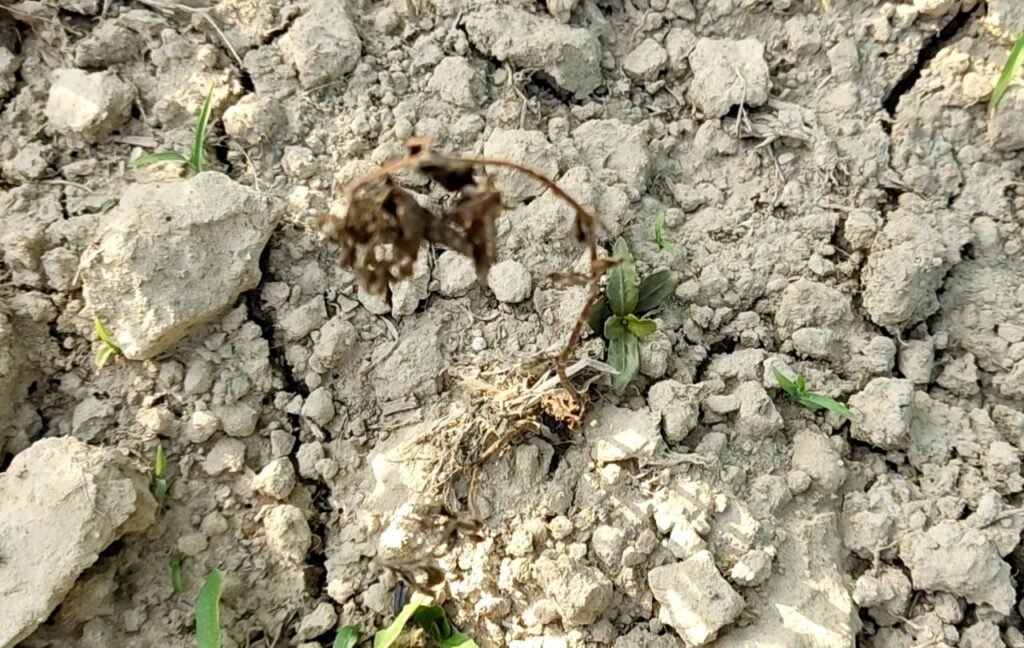
Because of this, farmers have to invest heavily in digging and constructing large reservoirs to store rainwater for their agricultural needs.
“If the pond is small, the water won’t last long. With the extreme heat, it dries up even before March,” said U Kyaw Win from Pauktaw Township to Border News Agency.
However, for those like U Kyaw Win, who cannot afford large investments, digging and storing enough water for the entire summer is not easy.
With the current fuel prices and excavation costs, it has become even more challenging, according to farmers.
“In the past, hiring an excavator (backhoe) cost around 100,000 kyats per hour, but now we have to pay up to 400,000 kyats,” they said.
“If we dig a proper pond, it costs nearly a million kyats. But if we dig a smaller one to save costs, it dries up as soon as winter ends,” said U Kyaw Win, who is personally struggling with water shortages.
Farmers in Arakan are not only facing water scarcity but also dealing with the soaring prices of agricultural inputs.
Essential farming supplies like fertilizers, seeds, pesticides, plant boosters, and fruit enhancers have increased by three to six times in price, according to farmers.
In the past, seed prices ranged from 2,000 to 3,000 kyats, but now they have skyrocketed to over 20,000 kyats, with some varieties nearing 40,000 kyats. Fertilizer prices, which used to cost around 15,000 kyats, have now risen to over 60,000 kyats per sack, according to farmers.
In addition to these price hikes, farmers are also facing difficulty purchasing necessary chemicals and seeds easily.
As a result, farmers in Arakan are facing numerous challenges in continuing their agricultural practices and ensuring the long-term sustainability of their farming activities.
Some farmers, who had been working the land for generations and relied on agriculture to provide for their families and educate their children, have slowly started to abandon farming, according to local farmers.
“This year, we’ve already lost over one hundred million kyats, and it won’t be easy to recover next year,” said U Kyaw Win, a chili farmer from Pauktaw Township, to Border News Agency.
The Threat to Food Security
The difficulties and challenges in agriculture have led to a significant reduction in the number of farmers, and it is said that there are now fewer farmers than before.
In regions like Laymro Chaung in the northern part of Mrauk U Township, where many seasonal and perennial crops are traditionally grown, it is reported that the number of farmers has declined sharply.
“The crops from Laymyro River are no longer coming as they used to. In the past, Laymyro River was one of the main suppliers, and boats would travel directly to sell their produce,” said a local from Sun Rae village in Minbra Township to Border News Agency.
Additionally, before the Myanmar junta closed the roads, there used to be regular shipments of vegetables and fruits from central Myanmar into Arakan, but now, with all the routes blocked, the supply has ceased, according to residents of Arakan.
“Vegetables and fruits have become scarce,” said a trader from Arakan to Border News Agency.
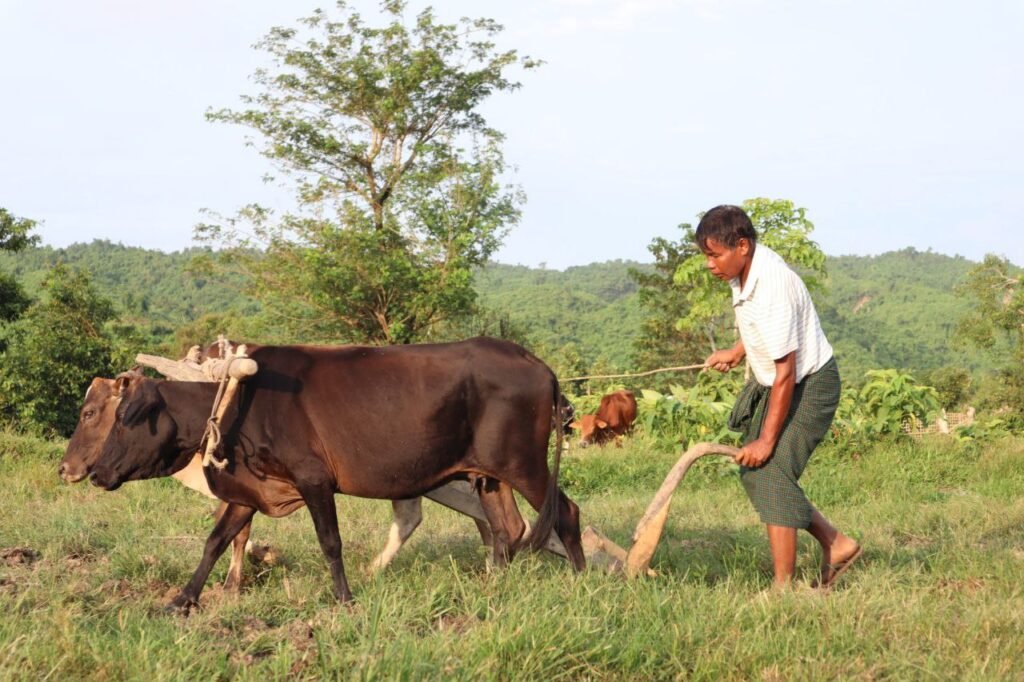
Due to the decline in the number of vegetable and fruit growers and the decrease in their output, local residents in the area are no longer able to enjoy fresh fruits and vegetables as they did before, according to the people of Arakan.
“In the past, we could buy vegetables (fruits and vegetables) in abundance. Now, we have to pay three or four times more,” said a household head from Myaybon Township with a family of four to Border News Agency.
According to activists involved in agriculture, the current situation in Arakan may lead to a threat to food security in the coming years, with potential follow-up health issues such as malnutrition and vitamin deficiencies.
This scarcity of food is considered a consequence of climate change and the ongoing regional conflicts, they pointed out.
The United Nations Development Program (UNDP) report released in November 2024 also predicts that, due to the disruptions in trade and the decrease in agricultural production, around two million people in Arakan could face food insecurity by mid-2025.
This is equivalent to two-thirds of the total population of Arakan, which is around three million people.
How Does It Affect Health?
As a consequence of global climate change, not only has there been a shortage of water and a failure to produce crops, but human health has also been significantly impacted, according to specialists and experts.
Due to global climate change and the alteration of natural environments, the rise in temperatures has caused ecosystems to collapse, leading to the extinction of important animal and plant species. As a result, humans, who rely on these species, have also seen their health negatively affected.
Air pollution, unclean drinking water, and a shortage of safe and nutritious food have also become major issues. As a result, these factors have led to the spread of infectious diseases and exacerbated mental health problems, according to experts.
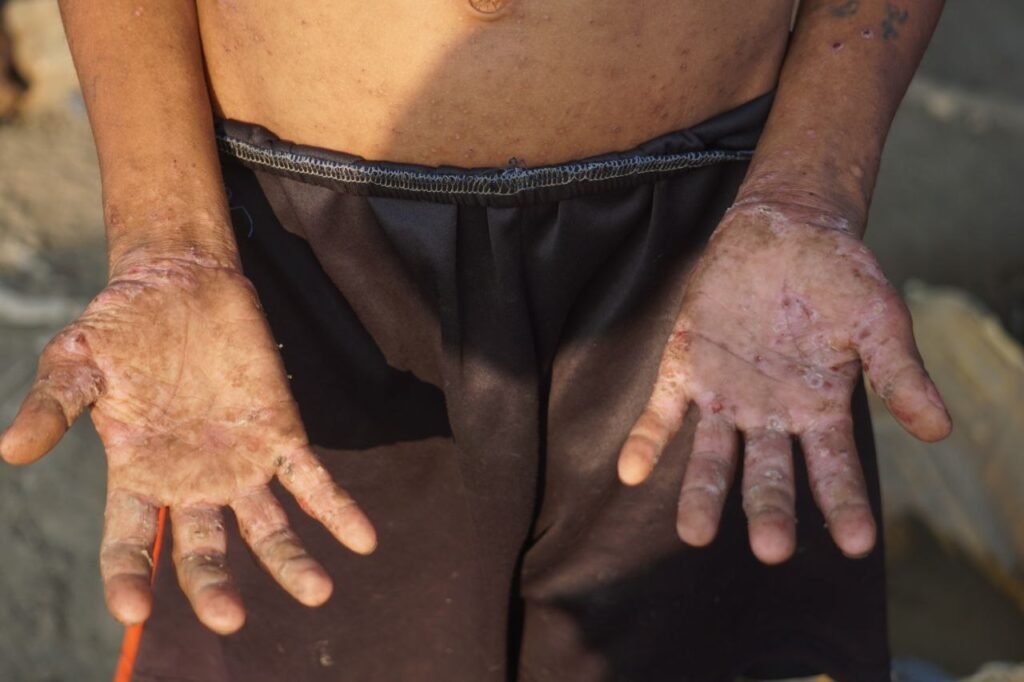
Due to global climate change, the currently experienced extreme heat and frequent flooding are worsening diseases and increasing the extent of damage, as stated by the European Academies’ Science Advisory Council (EASAC).
In addition, physical diseases have also increased, with a slight rise in temperatures leading to a higher occurrence of heart diseases, respiratory illnesses, and gastrointestinal diseases, according to doctors.
“When the climate changes, everything is affected. Extreme heat leads to negative health impacts,” said a general disease specialist to Border News Agency.
The changing global climate and extreme heat are also contributing to an increase in diseases like avian flu and malaria, which can spread through birds, experts say.
“The increase in mosquitoes is very noticeable. It affects every season. Even in the morning, they bite. The climate is no longer consistent,” said an elderly person aged over seventy years from Myaybon Township to Border News Agency.
The avian influenza virus, spread by mosquitoes, causes around 400,000 deaths annually worldwide and can spread more rapidly in warm areas, according to a report from the European Academies Science Advisory Council (EASAC).
In addition, with rising temperatures, harmful chemicals from polluted air, along with poor sanitation, are increasing, which can worsen diseases like pneumonia, experts warn.
This disease is also one that causes suffering to over 300 million people worldwide.
The World Health Organization (WHO) has also projected that due to climate change, from 2030 to 2050, approximately 250,000 more people could die each year.
It is time to give serious attention to climate-related disasters
Experts predict that in the coming decades, the global average temperature will rise by up to 1.5 degrees Celsius above current levels.
With such an increase in temperature, agricultural production may face greater challenges, and human health could deteriorate even further.
Therefore, experts emphasize the urgent need for collective efforts to mitigate the impacts of climate change and protect the environment.
Experts suggest that in order to mitigate climate change caused by increased carbon dioxide emissions, it is essential to protect existing forests from further deforestation and to plant more trees that can absorb carbon dioxide.
Additionally, to prevent the negative impact on agricultural activities, it is recommended to implement rainwater harvesting systems and expand irrigation systems to support farming and ensure water availability. Environmental conservationists and agricultural advocates emphasize these measures as crucial for sustainability.
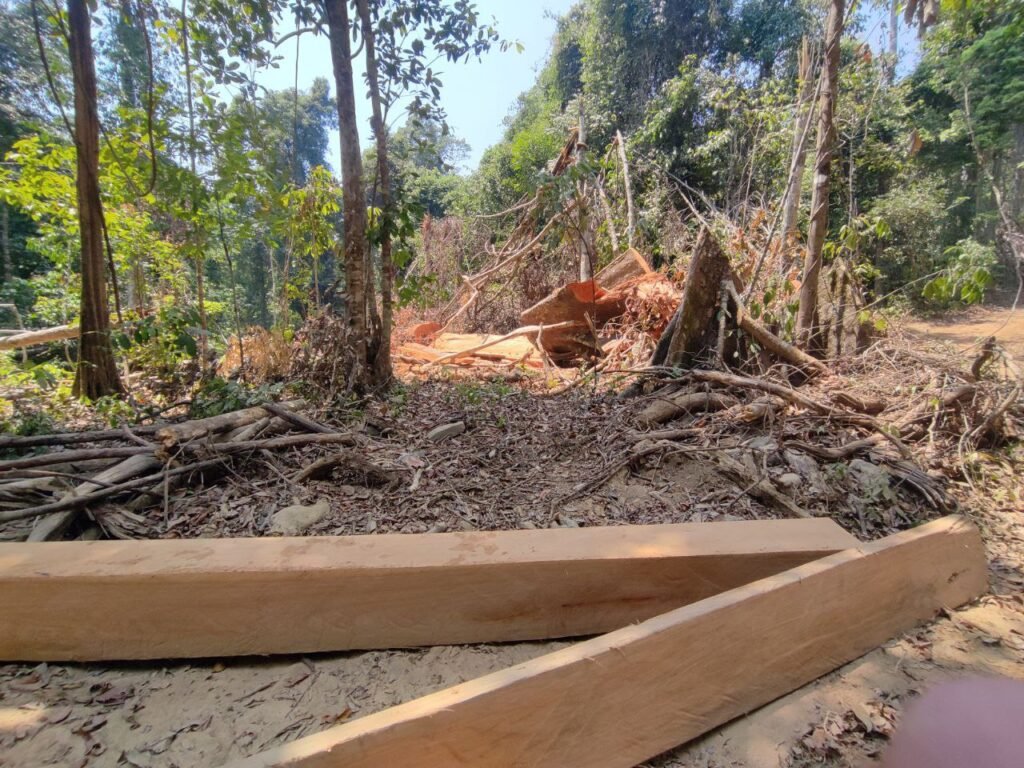
Compared to other states and regions, Arakan, which receives the highest rainfall, lacks efficient rainwater harvesting systems. Additionally, there are limited irrigation systems for paddy and dry-season crops.
Although there are some reservoirs in Arakan, the lack of proper irrigation channels and insufficient infrastructure means that only a small portion of the land can be used for dry-season rice cultivation, affecting over ten million acres of agricultural land in the region.
“If there are no forests, we cannot control groundwater. To grow not only rice but also other winter crops and alternative crops, we need a reliable groundwater source. If there is groundwater, even if rice doesn’t grow, other crops can still be cultivated,” said environmental activist Ko Myo Lwin.
During the final phase of the Arakan war, the Arakan Army has gained complete control over several areas, including Paletwa, Maungdaw, Buthidaung, Rathetaung, Ponnakyun, Kyauktaw, Mongbra, Myaybon, Pauktaw, Rambree, Thandwe, Taunggoke, Ann, and Gwa.
In the areas controlled by the Arakan Army, the Arakan People’s Revolutionary Government is said to be carrying out administrative functions and providing public services for the people of Arakan, according to local residents.
The Arakan People’s Revolutionary Government has stated that it is taking measures to prevent and take action against activities that harm environmental preservation and sustainable economic practices.
However, environmental activists have emphasized that simply imposing restrictions will not be enough. They argue that efforts to plant more trees and protect water sources, as well as implementing a national policy for environmental preservation, are essential.
“Environmental preservation is something that needs to be done in the long term; it cannot be accomplished gradually over time. If we don’t start now, the damage will be irreversible,” said a farmer’s advocate who has been involved in traditional agriculture for many years, speaking to the Border News Agency.
The people of Arakan have confirmed that in the areas governed by the Arakan People’s Revolutionary Government, there have been activities, including deforestation and other actions that damage and destroy the environment.
They also pointed out that, in addition to some civilians, certain members of the Arakan People’s Revolutionary Government have been involved in these activities, contributing to the environmental harm.
Environmental activists have stated that in order to preserve the resilience of the Arakan region against the adverse effects of global climate change, the Arakan People’s Revolutionary Government should have policies and plans in place to proactively combat climate change. They also emphasized that only by identifying and arresting all those involved in environmental destruction can the region ensure its long-term sustainability.






